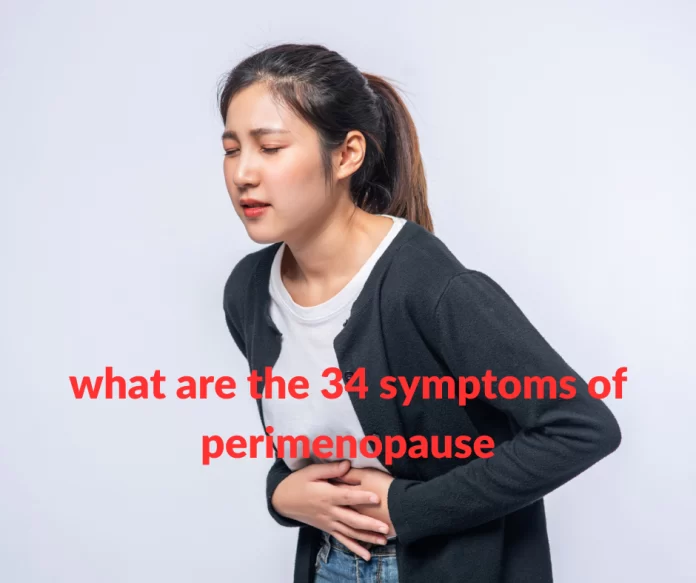Perimenopause is the period of transition that women experience before they reach menopause, which is defined as the point when they have not had a menstrual period for 12 consecutive months. This stage can begin several years before menopause and is characterized by hormonal fluctuations that can cause a variety of symptoms. While the exact timing and symptoms of perimenopause can vary from woman to woman, there are 34 common symptoms that have been identified by medical professionals. These symptoms can have a significant impact on a woman’s quality of life, and it is important to be aware of them so that appropriate care can be sought. In this article, we will discuss what are the 34 symptoms of perimenopause and what women can do to manage them.
What is perimenopause?
Perimenopause is a natural biological process that marks the transition from a woman’s reproductive years to menopause. It is characterised by hormonal fluctuations that can cause a range of physical and emotional symptoms, such as hot flashes, irregular periods, mood swings, and sleep disturbances. Perimenopause can last for several years and typically ends once a woman has gone 12 consecutive months without a menstrual period.
What causes Perimenopause?
Perimenopause is caused by a natural decline in the production of reproductive hormones, particularly oestrogen and progesterone. As a woman approaches her late 30s to early 40s, her ovaries begin to produce less of these hormones, leading to changes in her menstrual cycle and other symptoms associated with perimenopause. The hormonal fluctuations during perimenopause can also be affected by other factors, such as stress, poor nutrition, and certain medical conditions. While perimenopause is a natural process, some medical treatments, such as chemotherapy or surgery to remove the ovaries, can cause early onset of perimenopause.
What are the 34 symptoms of Perimenopause?
The 34 symptoms of perimenopause can vary in severity and duration from woman to woman, but here is a list of the most common ones:
- Irregular periods
- Hot flashes and night sweats
- Mood swings and irritability
- Fatigue
- Insomnia or sleep disturbances
- Vaginal dryness or discomfort during sex
- Decreased libido
- Changes in menstrual flow, such as heavy or light bleeding
- Breast tenderness or swelling
- Weight gain or difficulty losing weight
- Headaches or migraines
- Joint pain and stiffness
- Urinary incontinence or urgency
- Difficulty concentrating or memory problems
- Anxiety or depression
- Dry skin or hair loss
- Increased facial hair or acne
- Digestive problems, such as bloating or constipation
- Allergies or sensitivities to certain foods or substances
- Changes in body odour or skin texture
- Increased sensitivity to heat or cold
- Palpitations or irregular heartbeat
- Dizziness or vertigo
- Gum problems or increased tooth sensitivity
- Tinnitus or ringing in the ears
- Vision changes or dry eyes
- Hair growth on the chin, upper lip, or neck
- Osteoporosis or bone loss
- Increased risk of cardiovascular disease
- Increased risk of breast cancer
- Increased risk of osteoarthritis
- Increased risk of diabetes
- Increased risk of thyroid problems
- Increased risk of autoimmune disorders.
How long does perimenopause last?
Perimenopause can last for several years, with the average duration being around four years. However, it can last anywhere from a few months to up to ten years. The length of perimenopause can vary from woman to woman and can be influenced by various factors, such as genetics, lifestyle factors, and medical conditions.
What are the Treatment options for perimenopause symptoms?
There are several treatment options available for managing perimenopause symptoms. The treatment options can vary depending on the severity and type of symptoms experienced, as well as a woman’s overall health and medical history. Here are some common treatment options:
Hormone therapy
This involves taking oestrogen and/or progesterone to replace the hormones that the ovaries are no longer producing. Hormone therapy can be taken in the form of pills, patches, gels, or vaginal creams. However, hormone therapy may not be appropriate for everyone and can carry some risks, so it’s important to discuss the potential benefits and risks with a healthcare provider.
Non-hormonal medications
Antidepressants, gabapentin, and clonidine can be used to treat hot flashes, mood swings, and other symptoms.
Lifestyle changes
Eating a healthy diet, getting regular exercise, and reducing stress can help alleviate perimenopause symptoms. Avoiding caffeine and alcohol and getting enough sleep can also be beneficial.
Vaginal lubricants and moisturisers
These can help alleviate vaginal dryness and discomfort during sex.
Natural remedies
Some women find relief from perimenopause symptoms by using natural remedies, such as herbal supplements, acupuncture, or yoga. However, it is important to discuss these remedies with a healthcare provider as they may interact with other medications or have potential side effects.
Medical procedures
In some cases, medical procedures such as endometrial ablation or hysterectomy may be necessary to treat severe or persistent symptoms.
Can perimenopause affect fertility?
Perimenopause can affect fertility, as it is a transitional phase that marks the end of a woman’s reproductive years. During perimenopause, a woman’s hormone levels fluctuate, and her menstrual cycles become irregular before eventually stopping altogether, marking the onset of menopause. As a woman approaches menopause, her ovaries produce less estrogen, which can affect ovulation and fertility.
FAQ
Q1: How long does perimenopause last?
Ans: Perimenopause can last anywhere from a few months to several years, typically averaging around 4 years.
Q2: What are the first signs of perimenopause?
Ans: The first signs of perimenopause may include changes in menstrual cycles, hot flashes, night sweats, and mood swings.
Q3: Can perimenopause start at age 40?
Ans: Yes, perimenopause can start at age 40 or even earlier, although it is more common in women in their mid-to-late 40s.
Q4: What is the last stage of perimenopause?
Ans: The last stage of perimenopause is marked by 12 consecutive months without a menstrual period, indicating the onset of menopause.
Q5: What foods help perimenopause?
Ans: Foods that may help alleviate perimenopause symptoms include whole grains, fruits and vegetables, healthy fats, and foods rich in calcium and vitamin D.

























